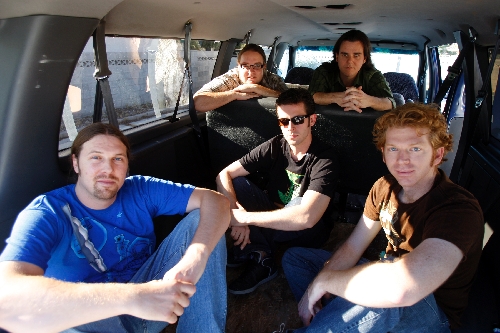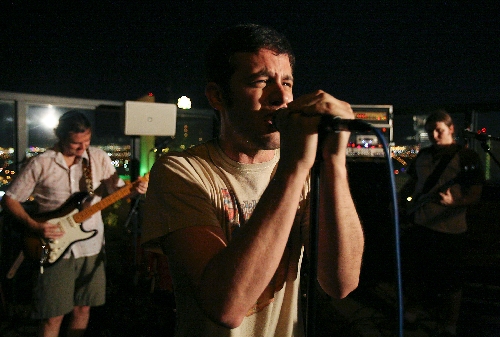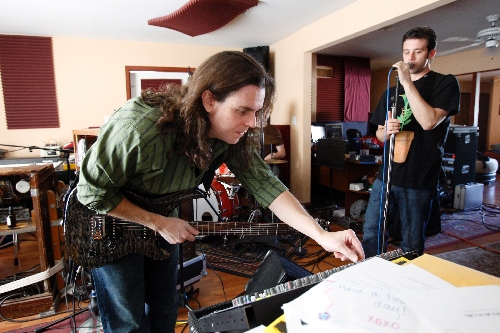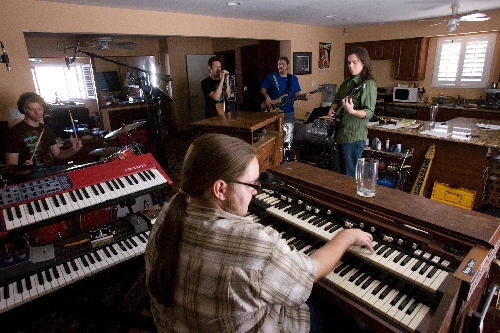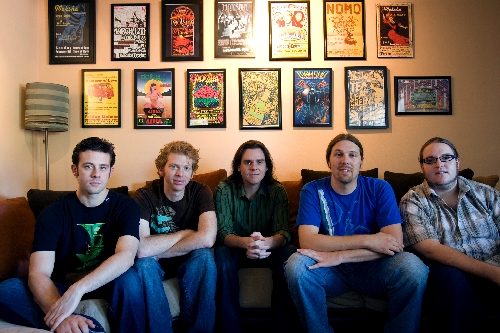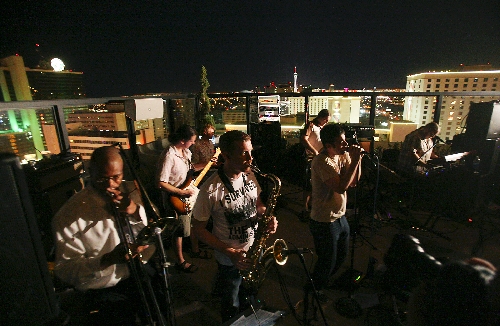Las Vegas jam band Moksha does its own thing on long, strange trip
The van comes to a halt in a dark parking lot where its occupants are met by a skyscraper-tall dude named Viking.
With legs as long as railroad ties, smothered in orange bell-bottoms the color of construction cones, Viking would be an imposing figure if he didn't possess the deliberate movements of a stoned tortoise.
He smiles at the quintet of musicians before him as they climb out of their ride, a blue 1994 Ford Econoline with an engine that groans like an overburdened ox.
The members of Las Vegas jam band Moksha have driven more than 300 miles to be here, going from the heat of the Nevada desert to the chill of a sweater-worthy summer night in Long Beach, Calif.
They greet Viking, a bassist with Cali funk fireballs Delta Nove, whom they'll be playing with in a few hours.
They take in the scene, standing just outside Alex's Bar, a shadowy rock club that's perhaps best known for doubling as the vampire hang Fangtasia on HBO's "True Blood."
Alex's is small and kitschy in a self-aware way, the perfect setting for a B-movie about a satanic Mexican biker gang, its walls lined with portraits of masked Luche Libre wrestlers and velvet paintings of menacing looking matadors.
Behind the bar, a portrait of the Last Supper illuminated by glowing lights sits above a painting of a demon taking a dump.
Stuffed rats cling to the lights above the pool table.
The place could pass for a really hip gargoyle's rec room.
Gradually, Alex's grows crowded with pretty girls wearing fedoras and flowers in their hair and lots of fellas with ponytails and yeti-worthy whiskers, filling up nicely for a Wednesday night.
One by one, the members of Moksha take the stage to jam with Delta Nove, whose percussive, horn-driven rumble is meant to be felt in the pelvis. Eventually, they get a brief set of their own at close to midnight.
It all begins with guitarist Jeremy Parks, a laid-back longhair whose fretwork is the opposite of his disposition: blustery and combative.
He plays from the back of his heels, eyes frequently shut, laying down a long, bluesy solo, his lips occasionally moving, as if he's talking the notes out of his instrument.
Organist Brian "Tree" Triola keeps a watchful eye over Parks and the rest of the crew, pistoning his legs up and down beneath his keyboard so hard that it becomes unplugged at one point, shouting commands to the rest of the crew like a quarterback calling out plays at the line of scrimmage.
Bassist John Heishman and drummer Pat Gray anchor a hard, yet fluid groove.
In the crowd, a bespectacled lady with flecks of gray in her long black hair dances in circles with such force that her skirt fans out in front of her.
Before long, singer Sam Lemos comes onstage for a reworking of the lithe bedroom funk of hip-hop duo Outkast's "Pink and Blue."
"Baby, why don't you teach me something new?" he asks in song, his voice smooth and supple, his movements a series of easy undulations, as if he had ball bearings for joints.
Moksha's set is short and to the point on this night: This is the first show of a two-week tour, a warm-up gig with friends that kicks off one of the many road treks that the group will undertake this year.
They're a do-it-yourself band, booking their own shows and self-releasing albums in an attempt to make a living outside the traditional bounds of the music industry, for the most part.
This is the savvy business model for bands in the Internet age: Instead of signing record deals with music labels who take a large chunk of any profits, Moksha keeps everything in house, financing their recordings, selling CDs at their shows and earning most of their income on the road.
And it's working.
In Vegas, Moksha has become one of the biggest local draws.
In March, they pulled in more than 600 fans at the House of Blues for the CD release show for their debut, "Mammal or Machine," and they're regularly good for crowds of several hundred at area gigs.
They're a blue-collar bunch, spending every day of the week either rehearsing or engaged in band-related busy work, reaching out to promoters, radio stations and music publications, working their music with the fervor of a politician perpetually out on the campaign stump.
"A lot of people think that being in a band is all parties and stuff, and it's really not," says Gray, a tall redhead who's almost as quick with a punch line as he is with a drum fill. "It's a hell of a lot of work."
Tonight demonstrates as much.
Moksha stays until the close of the club at nearly 2 a.m.
They mingle outside with drunken fans in the crisp night air until just about everyone's gone but themselves.
"I'm tired," Lemos sighs, which seems like an entirely reasonable sentiment at this point in the evening.
"You're not cut out for the road," Gray shoots back with a grin.
He's joking.
Kind of.
On the road again
The day begins where the previous night ends: in the van, now barreling down the highway toward Ocean Beach, Calif., a mellowed-out maze of taco vendors, vintage clothing shops and surfing gear retailers north of downtown San Diego.
It's populated, in large part, by what the members of Moksha lovingly refer to as "wookiees," especially shaggy hippy types who take their name from the Chewbacca character from "Star Wars," with whom they share a similarly furry countenance.
It's the kind of neighborhood where flip-flops are the preferred mode of transportation and the speed of life slows down dramatically, like an automobile with suddenly punctured tires.
Jimmy Buffett writes songs about places like this.
The trip here is a snapshot of the occasionally disorienting duality of life on the road: Time tends to trudge by, minute by minute, as monotonous and steady as the trickle of an IV drip, gradually building toward that 30 minutes to two hours spent onstage, where it flies by like the final moments of a vacation. Traveling from one show to the next is an exercise in attempting to sharpen the dullest moments of the day.
The road is often romanticized into a smorgasbord of willing groupies, adoring fans and stuff-of-legend parties where a TV eventually gets tossed out of a hotel window. In reality, it's about as seductive as the come-ons scrawled on the toilet stall of a truck stop men's room.
It's less a series of Jack Kerouac-style adventures than a daily grind of trying to find somewhere to eat at 3 a.m., dealing with drunks at Denny's (the only place open at 3 a.m.), texting and calling the girlfriends and wives left behind and attempting to connect with strangers every night to compensate for all the interrupted connections with those at home.
"You have to really redesign your life," Gray says, speaking from experience: He's quit work as a photographer to focus on Moksha full time.
Touring is an escape from the routine that becomes its own routine: wake up in the afternoon with the day half over, acquire coffee, pile into the van, drive for hours, check into the hotel, find the club, haul the gear, wait for the show to start, rock the crowd, load out, try not to party too hard, get ready to do it all over again the next day.
Repeat.
Repeat.
Repeat.
And yet, there is an addictive quality to it all -- why else would anyone do it? -- driven in large part by the possibility implied in the open road and the camaraderie of a group of dudes who occasionally get on one another's nerves, but who, taken together, form something much bigger than themselves: a band.
And so the guys in Moksha have learned how to live with one another in close confines for weeks on end.
"We can choke each other out and still be friends later that night," Heishman says with a knowing chuckle.
They kill time, on this trip, by listening to avant-garde jazz albums and dissecting production techniques for Radiohead records down to the point of theorizing about mic placement in the studio.
They're unabashed music nerds, all of them classically trained on their instruments for most of their lives, practically preordained for this kind of life since junior high. They're also a decidedly tongue-in-cheek bunch who could really impress an eighth-grade boys locker room with their frequent allusions to various bodily functions.
In this way, they're like a lot of self-acknowledged geeks: They're smart enough to know when to play dumb.
On the road, they all have their designated roles, for the most part: Heishman and Parks do much of the driving. Lemos handles the tunes, serving as the in-vehicle DJ. Gray and Triola help with directions, coordinate with friends coming to the show and plot set lists and potential cover songs.
Eventually, the band arrives at today's destination: Winston's, a squat brick concert club whose facade is decorated with a large, garish mural of a vengeful looking Poseidon that could have been cribbed from a really bad album cover by an even worse metal band.
Very fittingly, a Grateful Dead tribute band has played here every Monday night for the past 15 years.
Winston's is known as a launching pad for jam bands and has been a sought after gig for Moksha.
"It took us over a year to get this booking," Gray says. "We were calling and calling the (promoter), and then calling somebody we know who knows the guy, e-mailing people. Just a lot of that kind of tedious work."
This is the first time Moksha has played the San Diego area, and so they're an unproven commodity in these parts. This makes it hard to get phone calls returned for an up-and-coming band doing things on their own.
"Without a booking agent and never going to an area before, it's really tough to get bookings," Parks explains. "Getting the ball rolling is probably the hardest part."
"There's really no expectations," Heishman adds of playing a new city. "We hope just to excite one person who can bring a couple more people next time. The first time you hit a market, you don't turn a profit. It's just paving the way."
And that requires a lot of patience and trips to the post office.
For every show, the band makes fliers for the gig , sending them along with copies of their CD to the club they're playing as well as newspapers, record stores and local radio stations to try to drum up as much advance awareness as possible.
The fruits of their efforts are visible in Ocean Beach, where a flier adorned with a colorful caricature of the band sits in the window of Cow, a used record store just down the street from Winston's.
Oftentimes at out-of-town gigs where they're new to the city, Moksha plays for a split of the take at the door.
At tonight's show, however, the band is promised a guarantee of $250, a decent sum for their debut show in the area.
Parks' dad, Mike Parks, a computer whiz who oversees security systems for banks, travels with Moksha on most road trips in a large RV he shares with his wife.
Mike serves as Moksha's business manager, handling the band's trademark and copyright work, among other things.
He keeps an eye on merchandise sales and the head count at shows so that the band gets its fair share of the proceeds at the end of the night.
"We make some money with ticket sales," says Mike, an easygoing guy with the lightning quick computational skills of the programs he creates. "It's not an astronomical amount by any means, but any money these guys make, we put it back into the band.
"They're not living the high life," he understates, "but they're living."
The show goes on
They refer to it as "calling an audible," and it tends to begin with the opening of a hi-hat, the subtle changing of a snare pattern. It's the rock 'n' roll equivalent of the butterfly effect: a small movement that effects big change.
At Winston's it occurs with some frequency: Moksha's songs originate with a familiar arc but, like a sack of marbles let loose on a slippery surface, frequently veer off in a number of different directions at random.
Their tunes are full of musical head fakes and spontaneous misdirection, where the band leaves huge blanks in its tunes to be filled in when they're onstage.
Tonight, Moksha heats up gradually, transferring energy among themselves like colliding particles.
It's an open-ended sound that encompasses many things: a full-on country foot stomp with the voices of Triola and Heishman intertwined in rising, skyward-bound harmonies; a free jazz swing with big, rubbery bass lines; a hard funk take on Beck's "Sexx Laws" that rattles in the sternum.
A sizable crowd fills the modestly lit room, which is largely illuminated by candles atop marble tables that cast shadows over the framed portraits of Bob Dylan and Jerry Garcia that checker the brick walls.
At the beginning of the show, Lemos sits in the wings, rolling his shoulders to the beat, waiting for the cue to join his bandmates like an athlete on the sidelines eager to get into the game.
He's the newest addition to Moksha, who've been around for a little more than three years now, and whose focus largely has been on equally catchy and complex instrumental freakouts up to this point.
But Lemos is a growing presence in the group and they're a decidedly different band with him in the fold.
Their repertoire becomes more linear, concise and hook-centered with Lemos, as he lends them a crossover appeal, a heightened accessibility, that many of their peers in the jam band ranks lack.
"For me, that's the goal: to be able to have songs with hooks and verses and structure, but at the same time, appeal to the jam fans," Lemos says.
Three songs in, he bolts onstage.
The ladies in the crowd immediately perk up and take notice. He's like catnip to them, with his purring voice and boyish good looks.
Lemos is the quietest, most contemplative guy in Moksha, a skilled sax player who formerly performed in a hip-hop group.
But once he takes the mic in his hand, he becomes a much more animated presence, pounding a tambourine against his chest, twisting his features into pained-looking expressions like he's just been zapped with a Taser.
Lemos gives this largely decentralized band a focal point and broadens their reach beyond the kind of die-hard musos who form the bedrock audience of bands such as Moksha.
That crowd is definitely a core part of Moksha's following, and it's a devoutly dedicated lot. At most of their out-of-state gigs, Moksha has a contingent of hometown supporters who follow them to their shows even if they're several hundred miles away on a weeknight.
Tonight, a clutch of Moksha's Vegas regulars are here.
The band greets them with hugs, like long-lost relatives, and they're treated less like fans than revelers at the same party.
This contingent doesn't carry themselves like passive spectators of the group, but rather active participants in the community that's developed around Moksha, advocates who help spread the word on the band on message boards and at other shows in the jam band circles.
Despite the ability of a few acts of this ilk such as Phish and Widespread Panic to pack arenas and amphitheaters, this is not a mainstream scene, and it's nowhere to be found on the commercial airwaves.
Thus bands such as Moksha must rely on grass-roots marketing tactics, playing out as much as possible, holding impromptu concerts outside shows and festivals headlined by bigger acts and constantly networking with those who come to see them live.
"They're not being played on the radio, so most of their fans are coming from word-of-mouth from other fans, from meeting people or talking to people," says Moksha fan Keith Consalvo, a bearded scene lifer who's followed the band from their first shows and who takes in their Ocean Beach gig with his girlfriend, Julie.
Moksha returns all the love in kind.
They've played at weddings and funerals at their fans' behest, and earlier this day, they call up one Moksha loyalist and sing "Happy Birthday to You" to him into his voice mail.
"They put so much of their lives into just coming to see music," Lemos says of the band's following. "To see how free they are in the environment of our shows and how crazy they get, it's just like, I want to make music just so that we can complete the cycle of what these people work for."
All of that tends to create a celebratory air at Moksha gigs, which often feel like family reunions.
Most people come to dance -- for hours and hours on end -- and at Winston's they swing their hips with no visible inhibitions, whipping their arms through the air in what look like friendly kung fu moves.
Much like the music, there's no real parameters, just free-form boogeying.
Moksha plays two sets, clocking in at close to three hours.
They sell $65 in merch.
A decent crowd stays until the end of the show.
That means that the band's chances of getting booked here again are good, and hence, the night's deemed a success, even if it ends with Gray's hands swollen like a couple of overinflated zeppelins following a long night of playing and loading out gear at 2 a.m.
"That's what you have to do," he says the next day. "You have to prove yourself everywhere you go."
realities of rock
The longhaired dude shoots them a disapproving look, like they've just broken wind in public.
"Did you guys get added at the last minute?" he asks Parks, who's trying to find out what time Moksha's set is to begin tonight.
The stage manager, exasperation incarnate, a throbbing nerve ending in human form, didn't even know they were on the bill.
Welcome to Hollywood.
It's the band's third show in four days.
At least it's supposed to be.
Moksha's at The Cat Club, a long, narrow bar on the much mythologized Sunset Strip -- a golden land of opportunity for bands, in theory, a buffet of fake boobs and real egos in practice.
The hassles begin at the door, where the bouncer insists on brusquely checking the band's equipment cases for booze.
From there, it's a hard load in, dragging all the gear through the crowd and up a narrow flight of stairs to a small room on the second floor that serves as the band lounge.
An abundance of heavily perfumed, middle-aged ladies squish themselves into the red leather seating in front of the stage, making it smell like a ransacked Sephora shop.
They seem out of place in their miniskirts and high heels, looking like a bunch of "Sex and the City" extras, all dolled up to sip overpriced martinis beneath framed pictures of a leering Perry Farrell and a straitjacketed Alice Cooper.
They're clearly here to see a friend or relative's band, and they're ready to beat a hasty retreat when the act in question finishes.
Parks, the band missionary, gets to work.
"I just got that whole row of chicks to stay," he says proudly after convincing some of them to catch Moksha's set.
They won't have to stay put for long.
Moksha gets to play but three songs before the soundman cuts their performance short by cranking Bruce Springsteen's "Dancing in the Dark" through the PA.
It's all the time he can give the band tonight.
They've driven hours to be here.
They perform for a total of 18 minutes.
Still, they make the most of the opportunity, playing hard enough to conjure a sweat beneath a constellation of stringed white lights.
Lemos, sucking in his cheeks and puffing out his lips, eyes clamped shut, looks possessed by the spirit of Jim Morrison, who first made a name for himself playing The Whiskey right next door.
Triola bobs his head to-and-fro like a rooster pecking at some feed.
Afterward, a group of onlookers buys the band's CD and schmoozes with the band members.
Tonight, Moksha offers their disc for the price of a donation, any amount will do, just to get it in as many hands as possible.
They collect $35.
A few days later, Moksha will play in Berkeley, Calif., for three nights in front of hundreds of fans, earning enough scratch to cover expenses for the entire tour and turn a small profit.
But this is a paying-the-dues type of gig, and as such, the band pays $150 to play here, which is akin to tossing the schoolyard bully a C-note for a bloody nose (the band will get their money back for the aborted gig later).
This is the axis upon which life on the road swings: Highs are inevitably followed by lows, big crowds by small ones, triumph by tedium.
"It's all about finding a balance," Triola says.
Equilibrium is achieved on this night by sushi and sake after the show with friends who've traveled to the gig.
It's a modest coda to the evening, a decidedly non-rock star moment.
And that's the point.
"I don't define success as being a rock star," Gray says of what he's trying to get out of all of this. "If I can support myself and the people around me by playing music, that's successful, I think."
Then it's back in the van.
They won't be home for another week.
But even then, this journey won't come to an end.
It doesn't have one.
Contact reporter Jason Bracelin at jbracelin@reviewjournal.com or 702-383-0476.
Meet local jam band Moksha



